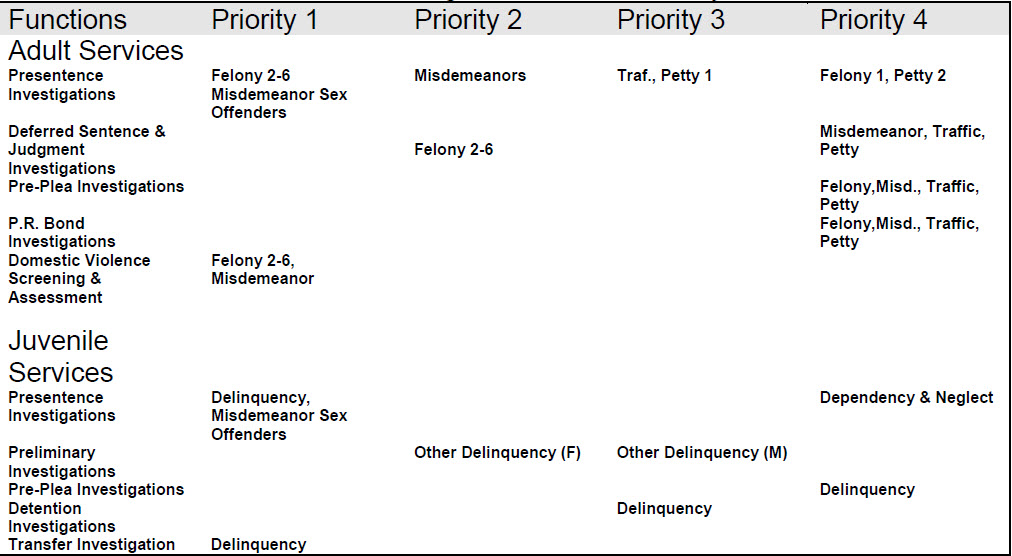Understanding Probation In Colorado – The Concept Behind Probation – How It Works
By H. Michael Steinberg – Colorado Probation Violation Defense Lawyer
Understanding Probation In Colorado – The Concept Behind Probation – How It Works – This brief article addresses some of the less obvious – political considerations underlying Colorado probation sentences.
Colorado Probation Departments And The Impact Of Declining Budget Resources
Sentencing options in less serious but significant criminal cases usually comes down to incarceration, probation (which is either supervised or unsupervised release in the community) or a combination of the two – probation with some jail. As a result of budget shortfalls all around Colorado, probation departments are turning to alternative methods of supervising sentenced offenders. Probation no longer has the resources and staff to actively supervise most criminally sentenced offenders in non-jail probationary settings.
Comparing Probation To Parole – Local Versus Statewide Resources
Parole is a statewide and coordinated program that MUST include formal contact between parolees and parole officers. In Colorado it can last for up to 5 years and the caseloads for parole officers – while large – don’t compare to county or locally based caseloads fro probation officers.
Probation and parole are very similar but they apply to different “segments” of the Colorado criminal justice system. Parole is the conditional release from state prison, is administered by the Colorado Department of Corrections. All probation “is local” and is imposed instead of a jail sentence.
To understand the priorities now placed on Colorado probation departments – the Colorado Supreme Court issued this directive.. It helps to explain much.
A Colorado prison inmate – when paroled from prison, is supervised in the community by a
parole officer while probation is a sentence which is imposed at the “front end” of the criminal justice system in lieu of a local jail sentence.
Probation is designed to help reduce prison over- crowding while controlling the threat of new crime in the community.
How Would You Describe Being On Probation In Colorado?
Probation is sentence imposed by judges that releases individuals convicted of crimes – into the community rather than putting them in jail or prison. A person on probation is not “free”
however. The probationer is subject to supervision by a probation department and is ordered to follow the “conditions of probation” imposed by the court at sentencing and more generally by the probation department under their broad jurisdiction to control probation.
Probation programs are supposed to “insure the protection of society, rehabilitate the offender and help him or her adjust to a lawful life in the community.”
Understanding Probation In Colorado – Who Receives Probation And Why?
Probation is all kinds of defendants – juveniles and adults, males and females, felons and misdemeanants. But some crimes prohibit probation for persons convicted of certain serious crimes felonies such as violent sexual assaults or homicides. Probation also may not be available in certain mandatory sentencing situations for other crimes of violence or for persons convicted of multiple felonies or with certain serious criminal “priors.”
The Theoretical Underpinnings Of Probation – Three Theories
The basis for imposing probation may be limited to three different theories:
Grace theory – A grant of probation in Colorado is a conditional privilege, a so called act of mercy by the judge. If any condition of this privilege is violated, probation can be revoked.
Contract theory – The Colorado probationer signs a stipulation agreeing to certain terms in return for conditional freedom. As in any contractual situation, a breach of contract can result in penalties, in this case revocation of probation.
Custody theory – The Colorado probationer is in the legal custody of the court and is thus a quasi-prisoner with limited constitutional rights.
Role of the Colorado Probation Officer – From Rehabilitation To Law Enforcement
When I was a young prosecutor – in the early1980s and through the 1990s – probation officers focused on BOTH rehabilitative and law enforcement roles. In his or her rehabilitative role – the probation officer acts almost as a social case worker. The focus is on the best interest of the offender. Today it is the probation officer’s law enforcement role, as a “control agent, an authoritarian figure, and therefore a threat to the offender’s conditional freedom.”
Today it is the protection of the community that is the focus of probation and only secondarily is it rehabilitation. Many of my clients have great difficulty understanding this as they go to sentencing.
In Colorado – a probation officer is designated in most instances as a peace officer under Colorado law. The PO has many – if not most – of the powers of a police officer. The PO is also the ‘eyes and ears” of the court and has the power to request probation revocation complaints for alleged violations of the conditions of probation.
Rehabilitation has become less and less important as PO’s take on the role of “enforcing” court-ordered punishments. Furthermore – rising probation caseloads end up reducing the time that probation officers can spend “in the field” with individual probationers.
A Good Reason To Get Along With Your PO – Arrests In The Event Of A Probation Violation
Since nationally 1 in every 10 offenders on probation will have their probation revoked for either technical violations or for new crimes, the ongoing relationship between the defendant and his or her probation officer is critically important. It should never be adversarial. A probation officer can be the probationer’s best friend or worst enemy.
The process of a probation revocation begin with the arrest and detention of probationers who are alleged to have violated the conditions of their probation. Arrests are not mandatory however – probation officers have the discretion to issue a summons and complaint with a court date and avoid the need for an arrest. Arrests can often lead to unnecessary confrontation or violence circumstances. If there is a trust based relationship between the two – a probation officer can sometime be convinced to proceed by summons and not arrest.
To Climb Into The Mind Of A Probation Officer – Understand First The Four GOALS Of Probation
The four most commonly accepted goals of probation are:
To keep the prison and jail systems from overcrowding.
To protect the community by reducing the rate of re-offenses by probationers.
To rehabilitate probationers by treating specific problems associated with their criminal activity.
To require the probationer to pay restitution (fines and fees) for his/her crimes.
Of these priorities the top priority of nearly 90 percent of all probation departments is community safety – not rehabilitation.
The Kinds Of Colorado Probation
There are three basic approaches to probation management in Colorado:
Intensive Supervised Probation (ISP)
In an ISP program, high-risk offenders that a judge believes needs daily structured regimentation undergo a kind of intensive supervision. This means frequent and unannounced contact by probation officers.
“Regular” Probation
Regular probation involves periodic visits or attend scheduled meetings with probation officers to discuss work, and progress of court ordered conditions of probation .
Unsupervised or So Called “Banked Probation”
Unsupervised probation places minimal or no requirements on the offender to visit or contact a probation officer. If you are on “banked probation” you will probably not see nor hear from any authorities while on probation. Sometimes you will receive a letter in the mail or a standard email – but nothing more.
Banked probation caseloads are intended for “low risk” offenders. These probationers are not flight risks and not a danger to society.
In Colorado – Probation Risk Assessment Tools Are Used To Target Certain Types Of Offenders
Some probation officers are assigned “specialized caseloads” that involve specialized counseling These include alcohol and drug abuse, mental impairment, family or domestic violence, sex offenders, economic crime and other close supervision caseloads.
Supplemental Contract Probation Services
Colorado Probation Departments Contract With Private Companies To Provide Probation Supervision
Colorado law – C.R.S. 19-2-204(4) (a) and 18-1.3-202(2) – permit the operation of contracts that run between probation officers and private companies that provide probation services.
(2) The probation department in each judicial district may enter into agreements with any state agency or other public agency, any corporation, and any private agency or person to provide supervision or other services for defendants placed on probation by the court.
These privately run companies supervise the lower risk probationers except they also are permitted to supervise those convicted of Driving Under the Influence, Driving While Ability Impaired, and other traffic offenders who meet the statutory definition of “Persistent Drunk Driver” as well as any other case deemed appropriate by the sentencing court.
Understanding Probation In Colorado
Denver Colorado Probation Violation Criminal Defense Lawyer
ABOUT THE AUTHOR: H. Michael Steinberg – Email The Author: mailto: [email protected] or call his office at 303-627-7777 during business hours – or call his cell if you cannot wait and need his immediate assistance – 720-220-2277.
If you are charged with A Colorado crime or you have questions about Understanding Probation In Colorado, please call our office. The Law Offices of H. Michael Steinberg, in Denver, Colorado, provide criminal defense clients with effective, efficient, intelligent and strong legal advocacy. We can educate you and help you navigate the stressful and complex legal process related to your criminal defense issue.
H. Michael Steinberg, is a Denver, Colorado criminal defense lawyer with over 40 years of day to day courtroom experience – specializing in Colorado Criminal Law along the Front Range. He will provide you with a free initial case consultation to evaluate your legal issues and to answer your questions with an honest assessment of your options. Remember, it costs NOTHING to discuss your case. Call now for an immediate free phone consultation.
Helping Clients To Make Informed Decisions In the Defense of Colorado Criminal Cases.
Contact A Lawyer with Three Decades of Experience as a Denver Criminal Attorney at The Steinberg Colorado Criminal Defense Law Firm Today.
Colorado Defense Lawyer H. Michael Steinberg provides solid criminal defense for clients throughout the Front Range of Colorado – including the City and County courts of Adams County, Arapahoe County, City and County of Boulder, City and County of Broomfield, City and County of Denver, Douglas County, El Paso County – Colorado Springs, Gilpin County, Jefferson County, Larimer County, and Weld County,…. and all the other cities and counties of Colorado along the I-25 Corridor… on cases involving …Understanding Probation In Colorado.

